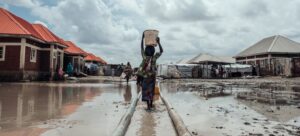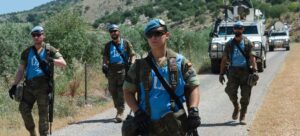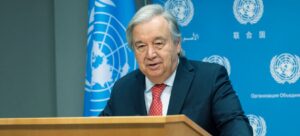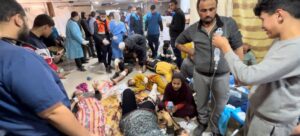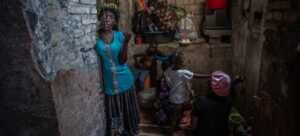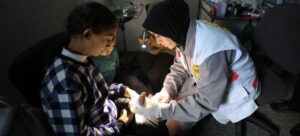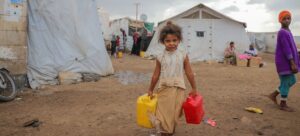Volker Türk, UN High Commissioner for Human Rights called on the authorities to conduct prompt, thorough and independent investigations into the attacks that took place on Christmas Eve and to hold those responsible to account in fair trials.
The violence occurred in the Plateau state, an ethnically and religiously diverse region, where inter-communal conflict has claimed hundreds of lives in recent years.
“The cycle of impunity fuelling recurrent violence must be urgently broken,” Mr. Türk said in a statement on Thursday.
“The Government should also take meaningful steps to address the underlying root causes and to ensure non-recurrence of this devastating violence,” he added.
A complex crisis
Located on the west coast of Africa, Nigeria continues to grapple a complex humanitarian crisis intertwined with climate change impacts and a deadly conflict in the country’s northeast regions.
An estimated 8.3 million people need assistance in Nigeria, with attacks on civilians and civilian infrastructure driving vulnerability and impeding access, according to the UN Office for the Coordination of Humanitarian Affairs (OCHA).
Protection needs are high, especially for women and girls, due to violence, abduction, rape and other forms of gender-based violence. Children are at risk of forced recruitment, especially when unaccompanied or separated from their families. Conflict and insecurity have cut people off from their agricultural production, resulting in food insecurity.
Climate change is also increasing humanitarian needs at an alarming rate. Last year, the country experienced its worst floods in more than two decades, which affected 4.4 million people. The flooding was a major contributor to the spread of cholera that killed 390 people in Borno state alone.

Sudan: WFP condemns looting at warehouse
The UN World Food Programme (WFP) has condemned the looting of life-saving food supplies from its premises in Sudan’s east-central Gezira state last weekend after elements of the paramilitary Rapid Support Forces (RSF) broke into its warehouse and office.
Sudan is in the midst of a bloody war between rival militaries, the Sudanese Armed Forces (SAF) and the RSF, which erupted in April 2023. Thousands of people have been killed and nearly seven million driven from their homes, including about 1.4 million into neighbouring countries.
According to the UN emergency food relief agency, its warehouse contained enough stocks to feed nearly 1.5 million severely food insecure people for one month in Gezira, where a new offensive has forced more than 300,000 people to again run for their lives.
The specialized nutritious foods were intended to prevent and support malnutrition treatment for more than 20,000 children and pregnant and breastfeeding women through WFP-supported health centres.
“Sudanese people who are already desperate and fleeing the fighting have now been robbed of the critical assistance they need. This is intolerable and must stop,” said Michael Dunford, WFP Regional Director for Eastern Africa.
“In areas under their control, the Rapid Support Forces must guarantee the protection of humanitarian assistance, staff and premises,” he added.
The UN agency also said that it was forced to temporarily pause distributions in Gezira last weekend and that it is once again reconfiguring its humanitarian response and has started some distributions in states further to the east, where people fleeing Gezira are now seeking refuge.
Earlier this month, WFP had warned of a looming “hunger catastrophe” in the war-ravaged country, if people are not able to urgently receive aid.

United States: Proposed rule changes would violate human rights
A UN independent human rights expert has said that proposed changes in the United States to the landmark Title IX education legislation would violate the rights to equality and non-discrimination of student-athletes that are biological women and girls.
The changes would also be in contravention to the country’s obligations under international human rights law, Reem Alsalem, UN Special Rapporteur on violence against women and girls, said in a news release issued on Wednesday.
“I share the concern expressed by women and girl athletes and women sports associations, as well as women and girls on sports scholarships, that the proposed Title IX rule changes would have detrimental effects on the participation of biological women and girls in sports, including by denying them the opportunity to compete fairly, resulting in the loss of athletic and scholarship opportunities,” she said.
The proposed change to Title IX would also lead to the removal of intimate spaces such as separate shower facilities and locker rooms for males and females.
Increased risks
“More importantly, it would lead to the loss of privacy, an increased risk of physical injury, heightened exposure to sexual harassment and voyeurism, as well as a more frequent and accumulated psychological distress due to the loss of privacy and fair and equal sporting and academic opportunities,” Ms. Alsalem added.
The Special Rapporteur has been in contact with the US Government about the concerns, according to news release.
In 1972, the US Congress passed the legislation, known formally as Title IX of the Education Amendments of 1972, 20 U.S.C. § 1681(a), to eradicate sex discrimination against women in education and ensure that girls could enjoy the same educational opportunities as their male counterparts.
Special Rapporteurs are appointed by the UN Human Rights Council and form part of what is known as its Special Procedures. The experts are mandated to monitor and report on specific thematic issues or country situations. They serve in their individual capacity, are not UN staff and do not receive a salary.
